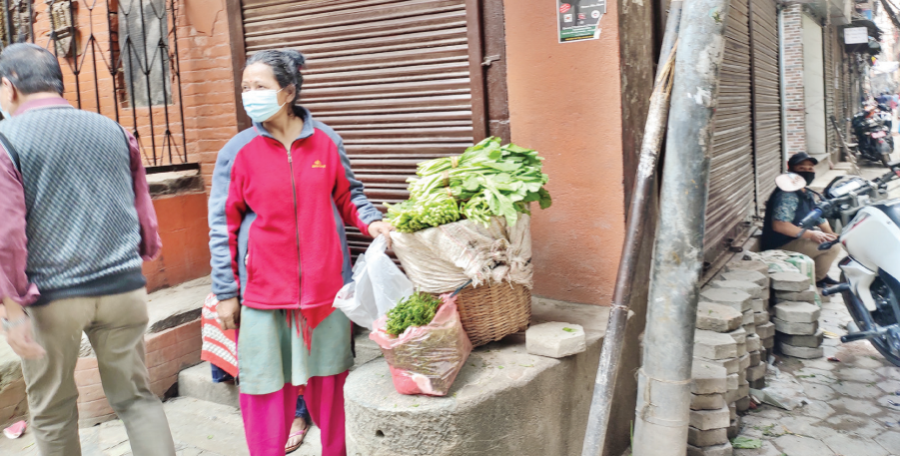Valley
Ban on roadside vending disrupts livelihoods of Kathmandu’s poor
Over 6,000 vegetables and fruits hawkers have been robbed of their incomes.
Anup Ojha
It’s half past seven on Sunday morning in an inner alley of Ason and Ganga Maya Tamang, hiding from police eyes, calls out to a few passersby to buy green leafy vegetables from her doko basket.
On Sunday, just like the past few days, the otherwise busy and crowded Ason was eerily quiet, except for the occasional shouts of the few vegetable hawkers and the sounds of police whistles at a distance.
Ason, the oldest marketplace in Kathmandu, is well-known for its shops selling daily essentials, spices, kitchen utensils, clothes and other household items. But for the past three days after the government introduced stricter prohibitory orders citing the Covid-19 pandemic, all is quiet here. Only the shops selling fruits, vegetables, meat, dairy products, water and cooking gas are allowed to operate until 9 am. Roadside vending is banned.
Just a few hundred yards away from her, at Ason Chowk, police have already detained over a dozen people for breaching the prohibitory orders. A few shops selling fruits and vegetables are open.
“This is injustice. Those who have shops are allowed to sell vegetables, but poor vendors like us have been barred from earning our livelihoods,” says 38-year-old Tamang, a mother of two sons aged 8 and 11. “I don’t think the coronavirus would go easy on the vegetable shops and singles out the roadside vendors,” quipped Tamang.
Everyday at 4am, she goes to the Kalimati vegetables market and comes to Ason to sell the vegetables.
“At Kalimati, I buy mustard greens, pumpkin shoots and garden cress for Rs500 and make around Rs900 here if I am able to sell them all. But some of the vegetables go to waste because there are fewer customers and the police are always after us,” said Tamang. Her youngest son, standing in a corner, keeps watch on the police.
“Many of my friends and I have been selling green leaves here for over two decades but this is the first time we have been barred from selling here. How am I going to feed my family If I am not allowed to do business here?,” asked Tamang, who lives in a rented room at Chhetrapati.
Her husband, a rickshaw driver, is jobless since the prohibitory orders were introduced in the Valley on April 29. According to Tamang, they need to pay Rs 15,000 for the two rooms they have rented.
Another roadside vendor, Vishnumaya, 76, who was found selling candies, biscuits, noodles and tobacco products on a nanglo (a bamboo respectacle), at Makhan near the Kathmandu Durbar Square on Sunday morning, also complained of police harassment. “At my rented room, the landlord keeps asking for unpaid rent and threatens to evict me and here the police threaten to put me in jail. I am helpless,” she said.
“I stay here till 10 am wearing a mask and I have covered my wares with an opaque plastic sheet so as to keep them hidden from police eyes,” said Vishnumaya. “People who come out to buy vegetables are also my customers,” she said. She lives alone in her rented room near the Bishnumati bridge on the way to Swayambhu. She says her monthly rent is Rs 5,000 and she hasn’t been able to pay the landlord for the past two months. “Since the lockdown, I haven’t been able to make more than Rs200 a day. Life has become very difficult,” she sighed.
Vishnumaya had descended to the capital after her house in Charikot of Dolakha was flattened by the 2015 earthquakes.
In the Kathmandu Valley, there are thousands of people like Tamang and Vishnumaya whose livelihoods have been severely disrupted by the Covid-19 restrictions.
According to the Kalimati Fruits and Vegetable Market Development Board, there are over 3,000 hawkers who roam around selling vegetables in bicycles or pushcarts and around the same number of fruits vendors, but they don’t have exact records of people like Vishnumaya and Tamang.
Jyoti Baniya, chairperson at the Forum for Protection of Consumer Rights Nepal, said the government decision to close the groceries and roadside vegetable shops is a “crime against humanity.”
“This could have been done only after declaring a health emergency, but the government hasn’t declared such an emergency. I feel there is some vested interest in closing everything completely even as the Covid-19 infections are decreasing in the Valley,” said Baniya.
On May 11, nearly three weeks ago, a total of 9,127 new coronavirus cases were reported across the country. Of them, 3,607 were recorded in Kathmandu Valley. But on Sunday, the country reported nearly three times fewer Covid-19 cases — 3,702 with 109 deaths Of them 1,093 were recorded in the Kathmandu Valley.
“The government announced the new restrictions fearing street protests against the dissolution of the House of Representatives,” Baniya claimed, adding, “The government is least bothered about the problems of the poor.”




 13.12°C Kathmandu
13.12°C Kathmandu.jpg)













